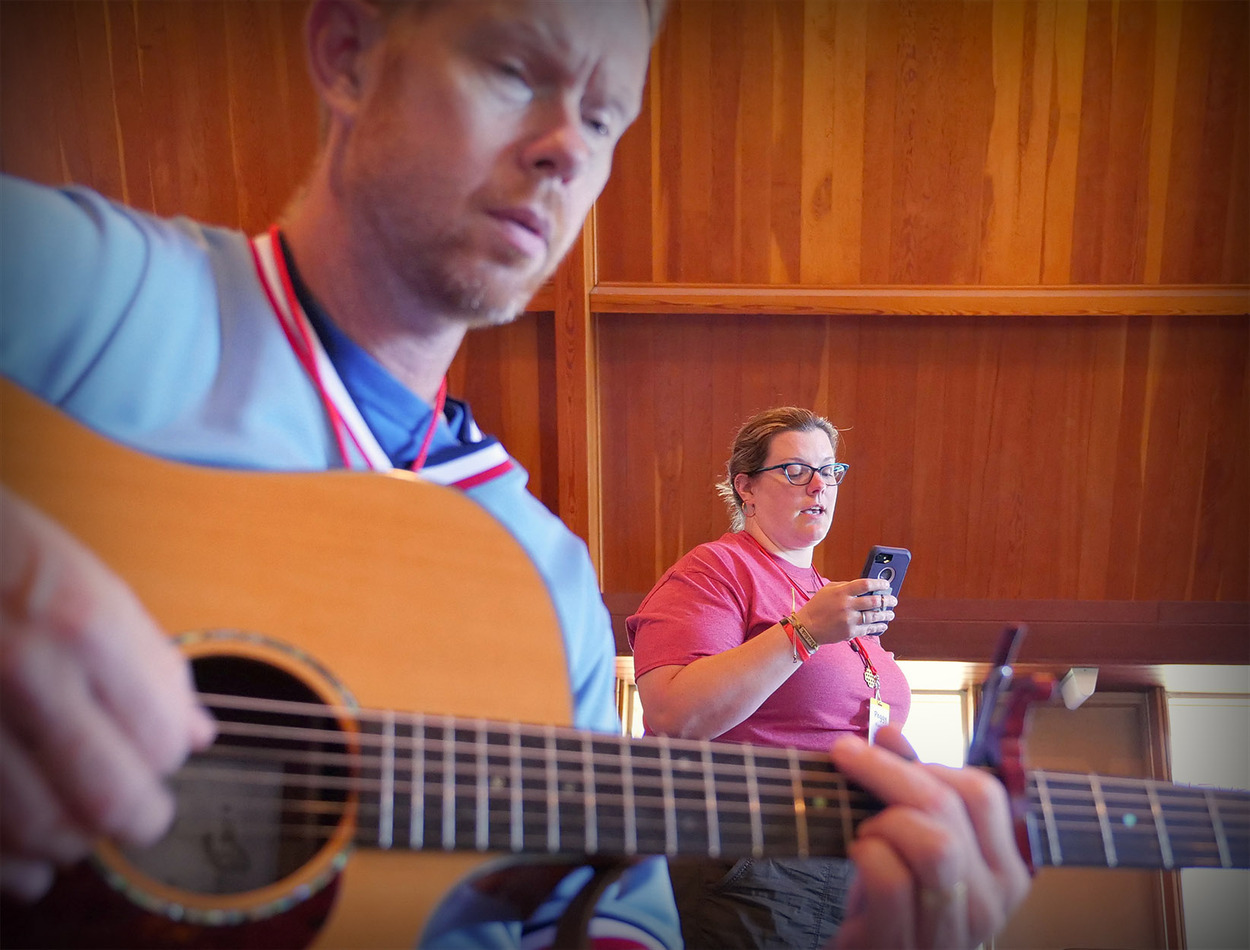
Camps are for everyone
“Youth group is great; Sunday School is great; but camp is that true place that’s set apart.”
-Rev. Peggy Hanson, Lead Trinity UMC
Reverends Peggy Hanson and Karl Kroger are both active in leading Dakotas camps. The two leaders have seen youth and adults expereince faith-building and life-changing moments at camp.

Rev. Eric VanMeter rehearses for worship with Rev. Peggy Hanson in the chapel at Lake Poinsett Camp and Retreat Center during LTC 2019.
The Next Normal
Hanson has been leading The Next Normal camp, together with co-dean Beata Ferris of Pierre First UMC, for several years. The Next Normal is a camp held at Storm Mountain Center for grades three through five. Together the deans have developed and refined the revolving curriculum for the camp experience, watch the camp grow in attendance, and in the deepen the faith-building experience.
Hanson says, “Every night we challenge the kids what they’re going to ‘give out’ – prayers, presence, gifts, service, and witness. We incorporate those five key aspects of the UMC's membership vows. So we ask them how they’re going to live them out.”
The two leaders send a letter, each January to the campers, re-capping what they learned at camp, including their challenges – what they said they were going to do – and invite them back to camp. The invitaion lists the dates for the upcoming camping season for The Next Normal and The Rock that Doesn't Roll camp. The letter is meant to encourage campers to build on the camp experience from the summer. Campers are reminded that they are not living out their faith alone back in their hometown and home church. The letter is a way to connect across the miles, even in the dead of winter, and encourage renewal and growth of the camp experience in the upcoming summer. Campers are invited to go to camp, even if it is a different camp with a different emphasis.
The first year Hanson and Ferris sent out 11 letters, the average is now around 40. Hanson considers the number a win for the youth and the Dakotas Conference’s next generation of leaders and campers.
LTC
Hanson and Kroger are regulars at Leadership Training Camp (LTC), held every July at Lake Poinsett Camp and Retreat Center. In 2019, Hanson was also a first-time dean for LTC, where high-school youth from across the Dakotas immersed themselves in sharing their journeys, strengthening their faith, and often meeting Jesus for the first time. The leaders strongly emphasized leadership skills, not just for the youth leaders-in-training, but also for the many counselors and adult leaders from local churches.
“For LTC,” says Hanson, “it’s always a little different, because we invite them to be as real and open as possible. In this place set aside, they can get pretty vulnerable, and share some very personal stuff.”
Campers and adult leaders establish a more lasting bond from LTC. The leaders check-back-in with the campers as the year progresses, often connecting with the pastors from the youth’s local church.
Hansons asks LTC participants, “What kind of a support system do you have, going back home? What kind of follow-up will there be? What are our next steps? "
Hanson and Kroger are trying to build upon those life-changing faith experiences, to nurture seeds that could lead to life-long ministries. And yes, even adult leaders grow in their faith while sharing experiences at LTC.
Rev. Karl Kroger, an adult counselor at LTC, said, “We have been fortunate at our camp to foster an environment whereby counselors can also grow in their faith, often honing a call to ministry, or hearing it with clarity.”
At last year’s LTC, Hanson wanted to treat the Conference Council of Youth Ministry—CCYM leaders as counselors-in-training. A way for them to grow in leadership roles. The CCYM leaders met every morning before worship for devotions and check-in, before the adult counselors, and worked together on understanding the collective and individual needs of the campers. LTC continues, through adaptive strategies, to equip youth and adults to lead and minister in a variety of ways in local churches, schools, and jobs, both immediately and into the future.
Importance of local church support
The role of the local church in supporting youth and the Dakotas camping program is crucial, both spiritually and financially. Kroger says he hopes to see more families and local churches growing in their excitement for camp, “Camp offers personal, social, and spiritual development opportunities. At camp, we witness more youth articulating, for the first time, that God loves them. We work to get those youth connected to youth groups, mission trips and local churches.”
Kroger states that churches that are continually committed and involved in camping and youth ministry generate the most excitement and momentum for ministry. “When churches help with scholarships, transportation, counselors, and follow-through after camp, it makes all the difference in the world. Youth who attend camp may be very knowledgeable about the Bible and faith or they may be discovering Jesus for the very first time.”
Camp registration for 2020 is now open. Families are already planning their summer schedules, and youth deserve the chance to attend camp. Before Camp Sunday is upon us, strategize how to get your church’s youth to experience the transformative, lasting faith experience they can have through the Dakotas Camping Ministry. And don't forget to fund your church's camp scholarships along the way. Camp Sunday is a great tool for kicking off a brief fund-raising effort that can have lifelong benefits for your youth and your congregation.
If you catch the spirit and want to be a Camp Ambassador for your local church, please contact Beata Ferris via e-mail.
Download details and resources from the Dakotas Camps website here.
Lastly, if you still think camp is just for kids, local church pastor, Rev. Karl Kroger sees the coin from both sides. He says that while camp benefits the youth and families who attend, “I cannot imagine local church revitalization without robust engagement in Dakotas camping ministry.”